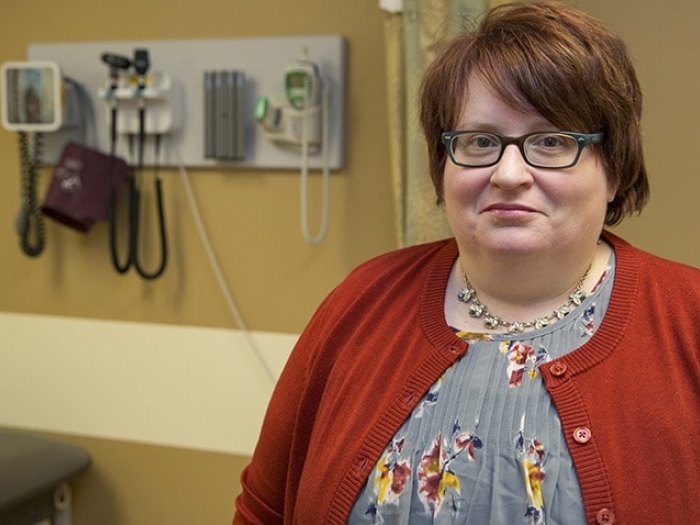People with MS who have sleep disorders notice more changes in their thinking
12:50 PM
Author |

artículo en español aquí
For women with multiple sclerosis who report cognitive dysfunction — one of the most common and disabling symptoms of the disease — sleep disorders such as insomnia and sleep apnea may contribute to the perceived decline, a Michigan Medicine study suggests.
Researchers analyzed data from more than 60,000 women using the 2013 and 2017 waves of the Nurses’ Health Study, a long-term study that focuses on risk factors for chronic diseases in women. Using composite scores of self-reported diagnoses and symptoms, they found that women with multiple sclerosis were more likely than those without MS to report sleep disorders, including obstructive sleep apnea, insomnia and sleepiness.
Results published in Multiple Sclerosis Journal also reveal that sleep disorders identified in 2013 contributed to cognitive problems reported by women with MS in 2017, including ability to follow instructions and conversations, as well as memory. Insomnia mediated more than 10% of these outcomes, and sleep apnea accounted for 34% of the total effect between MS and the ability to follow instructions.
“Sleep disorders have gained substantial recognition for their role in cognitive decline, which affects up to 70% of people with multiple sclerosis,” said lead author Tiffany Braley, M.D., director of the Multiple Sclerosis/Neuroimmunology Division and multidisciplinary MS Fatigue and Sleep Clinic at University of Michigan Health.
“Our results highlighted important pathways between sleep and perceptions of cognitive function in women with MS. We have previously identified important associations between objective cognitive performance and sleep in people with MS, but little is known about how sleep and MS interact together to impact long-term cognitive outcomes, particularly among women who are less likely to be diagnosed with sleep disorders,” Braley said.
Past studies have found that people with MS have a high burden of sleep disorders that have been shown to affect quality of life. As people with MS are at risk for sleep and cognitive problems, researchers sought to examine cognitive outcomes among nurses with MS and sleep disorders.
“With this longitudinal study design, we are able to better estimate the burden of sleep disorders among nurses, compared to health care claims data of similar size, which include diagnosed people with sleep disorders,” said senior author Galit Levi Dunietz, Ph.D., an epidemiologist and associate professor in the Department of Neurology’s Division of Sleep Medicine. “However, as sleep disorders are frequently under-diagnosed, health care claims data miss many people with sleep disorders who were not evaluated for these conditions.”
Interventions to delay cognitive decline in MS may be most effective in pre-symptomatic or early symptomatic stages, Braley says.
“Perceived cognitive decline, even in the absences of objective changes, could be an important window of opportunity to identify treatable exacerbating factors, such as sleep disorders,” she said.
Additional authors include, Monica M. Shieu Ph.D., Afsara B. Zaheed M.S., both from University of Michigan.
This work was supported in part from a Michigan Institute for Clinical and Health Research Pilot Grant (UL1TR002240), a T32 grant from National Heart, Lung, and Blood Institute (T32HL110952) and an F31 grant from the National Institute on Aging (F31AG067717).
Paper cited: “Pathways between multiple sclerosis, sleep disorders, and cognitive function: Longitudinal findings from The Nurses’ Health Study,” Multiple Sclerosis Journal. DOI: 10.1177/13524585221144215
Braley is co-founder of the University of Michigan Health MS Fatigue and Sleep Clinic. This specialty clinic offers a unique service to patients with MS and related inflammatory disorders of the central nervous system. Patients are seen by both a multiple sclerosis specialist/neuroimmunologist and a sleep physician, who provide evaluations and treatment for sleep problems and other causes of fatigue, using an approach that considers the specific issues faced by persons with MS and related conditions.

Explore a variety of health care news & stories by visiting the Health Lab home page for more articles.

Department of Communication at Michigan Medicine

Want top health & research news weekly? Sign up for Health Lab’s newsletters today!





